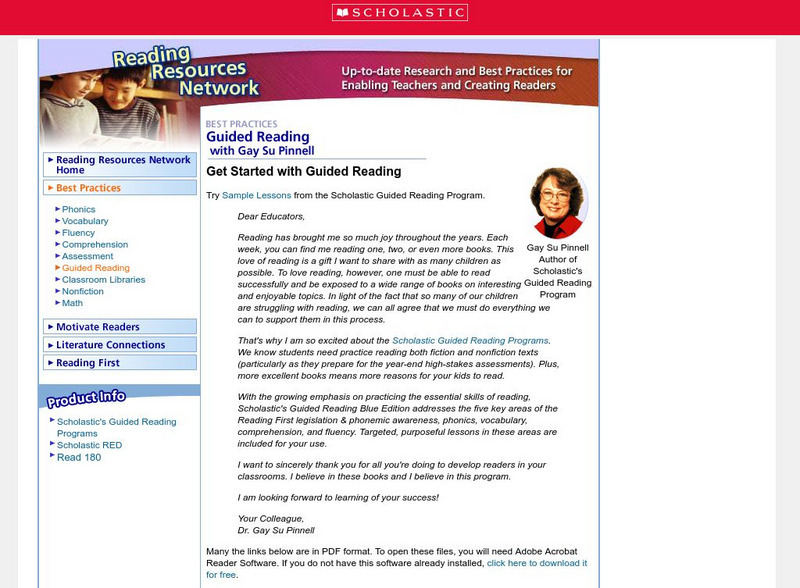Hi, what do you want to do?
Curated OER
Wig-wag Physics
Pupils make observations on the effects of a small, medium and large weight on the movement of a wig-wag apparatus. They use their observations to develop a generalized inference of the effect weight on movement patterns.
Curated OER
Mystery Boxes
Pupils make observations about Mystery Boxes that their teacher has made up and describes the motion of the object inside the box and hypothesizes it's shape based on their observations.
Curated OER
Physical Properties of Ice
Students demonstrate that ice melts faster under pressure. They recognize that ice can be broken up or melted by pressure and then refreeze.
Curated OER
Clues to the Past
Students take a 1.3 mile walking tour of Chippokes Plantation, inspect significant historic buildings and artifacts, and make inferences about plantation life from their observations while answering a series of questions.
Curated OER
The Museum as a Time Capsule: Mongolian Example
Students make defensible inferences based on observation of perceived evidence. They use observation and inference to recognize the validity of alternative approaches or solutions.
Curated OER
A Tacky Cheer
Second graders make predictions, copy cheers, and make inferences as they read a story about an odd bird and his awkward attempts to help his fellow penguins win a cheering contest.
Curated OER
Statistics and Shopping
Students examine statistics and data analysis concepts from the practical questions that arise in everyday life.
Curated OER
Mc Graw Hill: Part 2 Reading: Informational Text: Quote Accurately
Learn about quoting accurately and making inferences on this site. A link provides a model with text and supported inferences.
Other
Peoples Education: Make Inferences in Science [Pdf]
This online textbook selection focuses on how scientists make inferences from evidence. Students are given a reading passage about underwater exploration and are asked to make inferences based on the text. The passage is followed by...
Utah Education Network
Uen: Chances With Wolves
This lesson engages students in learning the differences among observations, facts, and inferences. Students will study about the reintroduction of wolves into the Rocky Mountain and Yellowstone Region. Students will work in small groups...
Other
Warren County Schools: Citing Textual Evidence
Well-organized and in-depth instructional activity on citing textual evidence and understanding inferences. Many examples are included, as well as exercises for the young scholars to practice what they have learned. [PDF]
Texas Education Agency
Texas Gateway: Literary Nonfiction
[Accessible by TX Educators. Free Registration/Login Required] In this lesson, you will learn how to analyze literary nonfiction, especially speeches, by making inferences and drawing conclusions based on evidence in the text. The...
University of Maryland
Voices of Democracy: John Fitzgerald Kennedy, "Inaugural Address" January 1961
John F. Kennedy's inaugural speech is one of the most famous speeches in American history. Teachers can use this lesson to teach Language Arts standards, as well as Social Studies standards. This lesson plan includes pre-reading ideas,...
PBS
Pbs Learning Media: Wolong's Pandas
Wild pandas are treated at the Wolong Conservation Center in this video segment from Nature.
Reading Rockets
Reading Rockets: Building Background Knowledge
The importance of background knowledge is especially salient in the age of Common Core. This article offers practical classroom strategies to build background knowledge such as using contrasts and comparisons and encouraging...
National Endowment for the Humanities
Neh: Edsit Ement:narrative and Persona in the Poetry of Robert Frost
Using Frost's famous poem, "Stopping by the Woods on a Snowy Evening" as an example of narrative poetry, students explore the artistry and significance of the narrative poem. In addition, this lesson plan provides suggestions for writing...
AdLit
Ad lit.org: Classroom Strategies: Inferential Reading
Teaching students to "read influentially" helps them learn how to read more strategically. This technique is derived from the teaching model that learners develop knowledge via the process of interpreting new information in light of past...
Scholastic
Scholastic: Getting Started With Guided Reading
How do you get started with guided reading? At this site one can find the answer to this question. The online lesson plans will help get students started with guided reading.
SMART Technologies
Smart: Web Resources for 3 5 Reading and Language Intervention
Tons of online resources for reading and language skills compiled nicely into a student-friendly SMART Notebook file.
Polk Brothers Foundation Center for Urban Education at DePaul University
De Paul University: Center for Urban Education: Letter to Grandmother [Pdf]
"Letter to Grandmother" is a one page, fictional, reading passage about a family of early settlers who moved west. A boy writes a letter to his grandmother telling her about their new life on the plains. It is followed by...
Polk Brothers Foundation Center for Urban Education at DePaul University
De Paul University: Center for Urban Education: See Our Progress [Pdf]
"See Our Progress" is a one page, fictional, reading passage about students who turned a vacant lot into a prairie garden and then were interviewed and shown on the television news. It is followed by questions which require students to...
Wisconsin Response to Intervention Center
Wisconsin Rt I Center: Text Dependent Questions [Pdf]
Describes a reading strategy where students must respond to text by supporting their ideas with text-based evidence. Lists different categories of questions the teacher can prepare based on the text chosen, with examples for each.
Curated OER
Mc Graw Hill: Use Details and Examples
Review how to use text evidence, details, examples, and personal experiences to make inferences then read a passage to practice on your own.
Curated OER
Mc Graw Hill: 4th Grade Use Details and Examples
When reading a story learn how to recall specific examples from the text to answer comprehension questions. In addition, you can also use story details to make inferences.













![Peoples Education: Make Inferences in Science [Pdf] eBook Peoples Education: Make Inferences in Science [Pdf] eBook](https://static.lp.lexp.cloud/images/attachment_defaults/resource/large/FPO-knovation.png)






